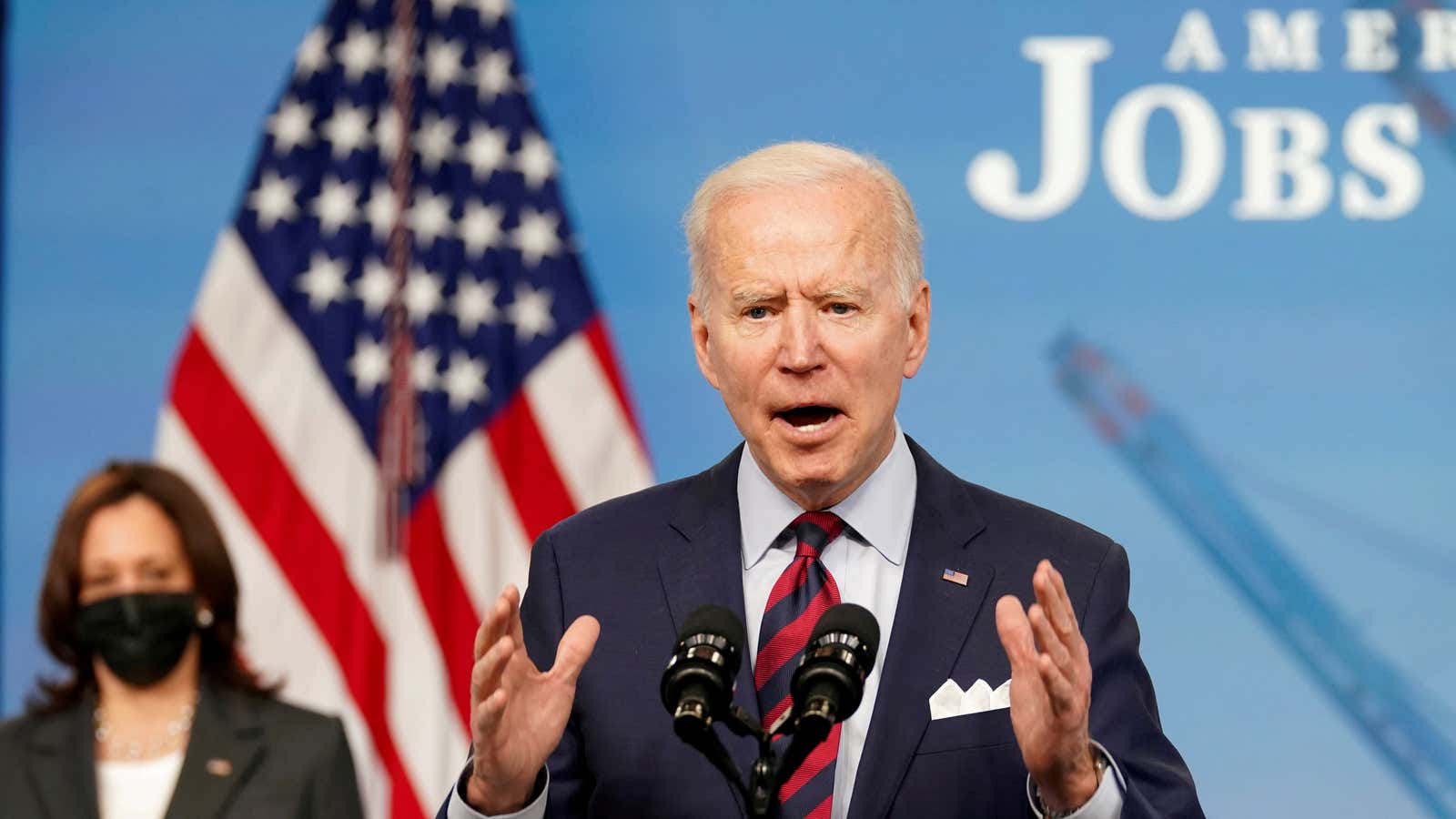President Joe Biden is asking Congress to approve a $6 trillion budget for the 2022 fiscal year—the most lavish level of federal spending since 1945. As the government funds a host of social welfare, infrastructure, education, and climate change measures, total expenditures will climb to $8.2 trillion by 2031. For a decade, the government will run a deficit of at least $1.3 trillion, according to Biden’s budget proposal, which was released May 28.
In part, this spending will be funded by $2 trillion by taxing corporations and wealthy individuals at a higher rate and by cracking down on offshoring profits. Biden plans to raise the corporate tax rate from 21% to 28%. The US government will also borrow extensively, and Janet Yellen, the Treasury secretary, told the US House on May 27 that she would be looking at the cost of interest on these loans to “judge the sustainability of federal finances.” The government expects interest payments to stay below 2% of GDP over the next decade—a level it considers sustainable.
The callback to the postwar years is apt. History shows that in the wake of severe shocks to the economy, public spending rises and then remains high for years. “People come to benefit from it and then to expect it,” said Price V. Fishback, a professor of economics at the University of Arizona. “That makes it harder to go back to a time of low spending.”
Fishback knows it has happened before. His principal area of research is the political economy of the New Deal, a period of intense public expenditure during the Great Depression that gave way to the even greater spending of World War II. “Federal net outlay, as a share of GDP, went from 3% to 9% by the end of 1933, and then to nearly 10% by the end of the 1930s,” Fishback said. “The war comes in, everything explodes, and it’s 41% by 1944.” It wasn’t just that the government spent on infrastructure or welfare or the military, he said. It was that the government imposed more regulation and taxes as well. The state grew bigger in nearly every way—and it has never permanently shrunk since.
Indeed, the American government grew on the back of emergencies such as the Great Depression and the world wars, the economist Robert Higgs found in his book “Crisis and Leviathan.” (Higgs has described himself as a “libertarian anarchist,” and his book has an elegiac nostalgia for “a time, long ago, when the average American could go about his daily business hardly aware of the government—especially the federal government.”) Analyzing the effect of the wars and the Great Depression, Higgs wrote: “Chief among the enduring legacies of emergency governmental programs has been ideological change, in particular a profound transformation of the typical American’s beliefs about the appropriate role of the federal government in economic affairs.”
The pandemic represents another crisis of the kind Higgs discussed in his book, so if his observation is any guide, the size of the state and its expenditure will not shrink in a hurry. “It’s easy to for people to think: ‘Yeah, I survived the pandemic only because of this money,’” Fishback said. “It will open the door for more spending.”
The Biden administration expects that deficits will eventually dwindle—that these levels of expenditure will pave the way for long-term growth, leading to more tax revenues. The budget predicts that, after rebounds in growth this year and next, the economy will expand at 1.8-2% through 2030.
Both the House and the Senate are controlled by Democrats, but Biden will still need all the support from Democrat legislators that he can get. He faces some sticking points. The budget proposes a 1.7% rise in military spending, but some Democrats, such as rep. Mark Pocan of Wisconsin and rep. Barbara Lee of California, want the military’s budgets to be slashed. At least one Democrat, sen. Joe Manchin of West Virginia, thinks the suggested 28% corporate tax rate is too high.
This post has been updated with details from the Biden administration’s budget proposal.
Correction: The title of Robert Higg’s book is “Crisis and Leviathan” and not “Crisis in Leviathan,” as cited earlier.
